Obama accuses Romney of dishonesty in debate
Thursday, October 4, 2012
updated 6:09 PM EDT, Thu October 4, 2012
Did you miss the first presidential debate? You can watch the full event online on CNN.com.
(CNN) -- A day after losing the first presidential
debate to Mitt Romney, President Barack Obama and his campaign accused
the Republican challenger of dishonesty over tax policy and other
issues.
"If you want to be
president, you owe the American people the truth," Obama told a campaign
rally Thursday in Denver in reference to the former Massachusetts
governor, who is challenging him in next month's election. "So here's
the truth: Governor Romney cannot pay for his $5 trillion tax plan
without blowing up the deficit or sticking it to the middle class.
That's the math."
The president's top aides were even more blunt.
"Romney's performance was one that's probably unprecedented in its dishonesty," senior adviser David Plouffe told reporters.
However, senior campaign
adviser David Axelrod acknowledged that Obama would examine his debate
strategy for the next two contests -- on October 16 in New York and
October 22 in Florida.
The president opted
against "serial fact-checking with Governor Romney, which can be a
never-ending, exhausting pursuit," Axelrod said. "Obviously, going
forward, we're going to have to look at this and we're going to have
make some adjustments."
Meanwhile, Romney
continued to push his debate theme of too much federal spending under
Obama, complaining of "trickle-down government" that has failed to solve
the nation's economic woes.
"We have two very
different courses for America -- trickle-down government or prosperity
through freedom," Romney said in an unannounced visit Thursday to a
conservative conference in Colorado. "And trickle-down government that
the president proposes is one where he will raise taxes on small
business, which will kill jobs. I instead want to keep taxes down on
small business so we can create jobs."
Romney will campaign
later Thursday in Virginia, hoping to build momentum from the debate
that analysts and a snap poll agreed was won by the Republican
challenger.
His supporters crowed about his performance, saying it reshaped a race that Romney had appeared in danger of losing.
Sen. Rob Portman of
Ohio, who played the role of Obama in debate rehearsals for Romney, said
the GOP candidate had a "terrific night."
"He did exactly what he
had to do for the undecided voter in Ohio or around the country,"
Portman said. "They were looking for two things: One, a discussion of
the last four years and why we can't afford it for the next four, I
thought he explained that well. Most importantly, he talked about his
own policies and he was able to set the record straight on some of the
misleading ads the Obama campaign has put out there about his tax plan
about his budget plan, about his health care ideas and so on."
To Ed Gillespie, a senor
adviser to Romney, the GOP challenger brought focus to the sharp
contrast between the candidates by showing voters that "we can't afford
four more years like the last four years."
In exchanges full of
policy proposals, facts and figures, Romney was more aggressive in the
90-minute encounter on Wednesday night at the University of Denver.
A forceful Romney
criticized Obama's record and depicted the president's vision as one of
big government, while the Democratic incumbent defended his achievements
and challenged his rival's prescriptions as unworkable.
The post-debate verdict swung clearly to Romney.
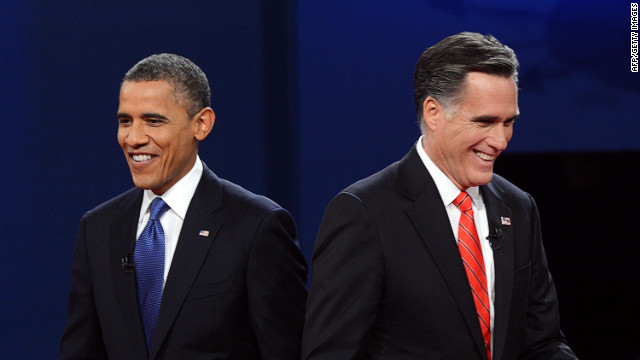 Photos: The first presidential debate
Photos: The first presidential debate
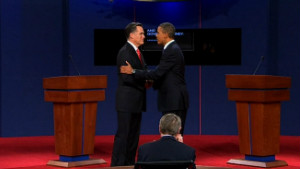 Obama and Romney debate in Denver
Obama and Romney debate in Denver
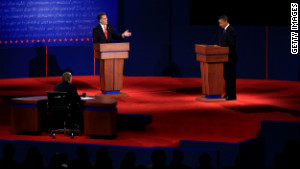 Best 'zingers' from debate night
Best 'zingers' from debate night
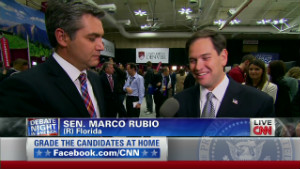 Rubio: Obama uncomfortable at debate
Rubio: Obama uncomfortable at debate
"A week ago, people were
saying this was over. We've got a horse race," said CNN Senior
Political Analyst David Gergen, who called the debate Romney's best so
far after the 22 the former Massachusetts governor took part in during
the GOP primary campaign.
Alex Castellanos, a
Republican strategist and CNN contributor, expressed surprise at
Romney's strong performance, saying he "rose to the moment" and seemed
to benefit from the multiple primary debates.
"It looked like Romney
wanted to be there and President Obama didn't want to be there," noted
Democratic strategist and CNN contributor James Carville. "The president
didn't bring his 'A' game."
The CNN/ORC International poll of 430 people who watched the debate showed 67% thought Romney won, compared with 25% for Obama.
Obama joked Thursday
that a different Romney appeared at the debate from the conservative
candidate who won a grueling Republican primary campaign to challenge
him on November 6.
"When I got on to the
stage I met this very spirited fellow who claimed to be Mitt Romney,"
Obama said to laughter from the crowd of more than 12,000 at a Denver
park. "But it couldn't have been Mitt Romney because the real Mitt
Romney has been running around the country for the last year promising
$5 trillion in tax cuts that favor the wealthy. The fellow on stage last
night said he didn't know anything about that."
At the Denver rally and a
later event in Wisconsin, Obama also went after Romney's pledge during
the debate to cut funding for public broadcasting, referring
specifically to the popular Sesame Street character Big Bird.
"He'll get rid of
regulations on Wall Street, but he's going to crack down on Sesame
Street," Obama joked about Romney's pledge to repeal the Dodd-Frank Act
that reforms the financial sector.
"Thank goodness somebody
is finally getting tough on Big Bird," Obama added. "It's about time.
We didn't know that Big Bird was driving the federal deficit."
On Wednesday, neither
presidential candidate scored dramatic blows that will make future
highlight reels, and neither veered from campaign themes and policies to
date.
But Romney came off as
the more energized candidate overall by repeatedly attacking Obama on
red-meat issues for Republicans such as health care reform and higher
taxes, while the president began with lengthy explanations and only
later focused more on what his opponent was saying.
Moderator Jim Lehrer of
PBS had trouble keeping the duo within time limits for responses,
especially Obama, who ended up speaking four minutes longer than Romney.
Romney's strongest
moments came in emphasizing his frequent criticism of Obama's record,
saying the nation's high unemployment and sluggish economic recovery
showed the president's policies haven't worked.
"There's no question in
my mind if the president is re-elected, you'll continue to see a
middle-class squeeze," Romney said, adding that another term for Obama
also will mean the 2010 Affordable Care Act, known as Obamacare, "will
be fully installed."
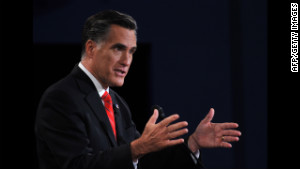 Romney: Banks reluctant to give loans
Romney: Banks reluctant to give loans
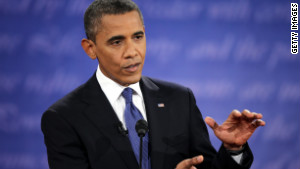 Obama: 'Please elaborate' on health care
Obama: 'Please elaborate' on health care
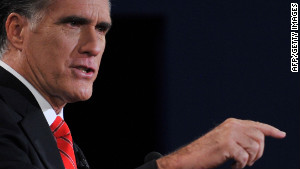 Romney: Not looking for $5 trillion cut
Romney: Not looking for $5 trillion cut
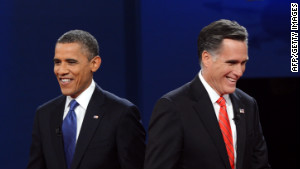 Obama: Occasionally you have to say no
Obama: Occasionally you have to say no
At another point, he
noted how $90 billion spent on programs and policies to develop
alternative energy sources could have been devoted to hiring teachers or
other needs that would bring down unemployment.
Obama argued that his
policies were working to bring America back from the financial and
economic crisis he inherited, and that Romney refused to divulge
specifics about his proposed tax plans and replacements for the health
care law and Wall Street reform that the Republican has pledged to
repeal.
"At some point, the
American people have to ask themselves if the reason that Governor
Romney is keeping all these plans secret is because they're too good,"
Obama said, adding the answer was "no" and that the lack of details
reflected the difficulty in making touch decisions.
In his strongest line of
the night, Obama said Romney lacked the important leadership quality of
being able to say "no" when necessary.
"I've got to tell you,
Governor Romney, when it comes to his own party during the course of
this campaign, has not displayed that willingness to say no to some of
the more extreme parts of his party," Obama said in reference to his
challenger's swing to the right during the primaries to appeal to the
GOP's conservative base.
Romney rejected Obama's
characterization of his tax plan, insisting it won't add to the deficit,
and criticized the president's call to allow tax rates on income over
$250,000 for families and $200,000 for individuals to return to higher
1990s rates as a job-snuffing tax hike on small business.
Romney repeatedly went
after Obama on the health care reform bill, criticizing the president
for focusing so strongly on a measure that passed with no Republican
support instead of devoting more attention to creating jobs.
"I just don't know how
the president could have come into office, facing 23 million people out
of work, rising unemployment, an economic crisis at the -- at the
kitchen table, and spend his energy and passion for two years fighting
for Obamacare instead of fighting for jobs for the American people,"
Romney said.
"The right answer is not
to have the federal government take over health care," Romney added,
quickly noting his plan would include popular provisions of Obamacare
such as allowing children up to age 26 stay on family plans and
preventing insurers from denying coverage for pre-existing conditions.
In response, Obama said
Romney's stance to have states craft their own health care plans would
allow insurance companies to return to past practices that hurt
consumers.
On Thursday, Axelrod
described Romney in the debate as a "serial evader" and "artful dodger"
for avoiding specifics on tax loopholes and deductions he would
eliminate or proposals to replace health care reforms and Wall Street
reforms he promises to repeal.
Romney came under
similar criticism from opponents in the Republican primary campaign,
with former House Speaker Newt Gingrich calling him a liar in January.
Before the debate,
Romney warned that Obama would be untruthful, and he accused the
president of dishonesty and distortion during Wednesday night's event.
With polls narrowing
less than five weeks before Election Day, Obama and Romney launched a
new phase in a bitter race dominated so far by negative advertising as
both camps try to frame the election to their advantage.
Whether it matters is
itself a topic of debate. According to an analysis by Gallup, televised
debates have affected the outcome of only two elections in the past half
century -- Nixon-Kennedy in 1960 and Bush-Gore in 2000.





0 comments:
Post a Comment